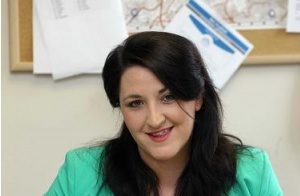Role: Policy Officer
Company: Community Relations Council
Track Record: ‘As my mother taught me, everyone has something to learn and everyone has something to teach,’ she says.
What does your job entail?
The Community Relations Council (CRC) works to lead and support change in Northern Ireland towards reconciliation, tolerance and mutual trust.
My role as policy officer with CRC spans a number of elements, including advocating, supporting and developing policy that embeds peace and reconciliation, good relations and equality. Crucially, my work addresses the impact of the conflict on those who have suffered most from it and the building of a shared and reconciled society.
I work across a variety of areas including flags and emblems, interfaces, the legacy of the past and shared and sustainable housing. I research these issues, draft options papers for discussion with key stakeholders, develop policy positions and provide evidence-based briefings and policy analyses.
I also organise events which promote dialogue through engaging with our elected representatives, community relations practitioners and civic society.
How did you get into community relations work?
My mother Veronica has always been involved in community work and I followed her lead from a young age. I don’t see it so much as work, but as a way to contribute to improving society as a whole.
As a 12-year-old, I was really intrigued and excited by the euphoria around the signing of the Belfast Agreement without fully understanding the detail or significance of it. I was inspired by the potential to create new opportunities and a new beginning for my generation and generations to come.
Sometimes the rhetoric of community relations work is that it’s somehow ‘fluffy’.
In reality it’s about recognising that conflict, segregation, division and hurt require collective efforts by government, organisations and individuals to achieve the vision enshrined in the Belfast Agreement.
What projects are you working on at the moment?
I am currently developing a discussion paper on the display of flags, how it impacts on shared space, economic development, the future of interfaces and I’m exploring the aspect of cultural accommodation in a divided society.
CRC developed a strategy to support the development and delivery of short, medium and long-term actions to address social, community, physical, economic, security and safety issues in interface areas. This work builds upon existing good practice and initiatives to regenerate interface areas, aiming at the creation of open and vibrant communities.
I am currently involved in organising an event regarding young people’s views of interfaces and how they would like to be engaged in conversations about their transformation.
Two other projects are also part of my remit: the first explores how local councils can be supported to embed peace-building skills as the Review of Public Administration moves forward; the second focuses on contested spaces in rural communities, which is a subject close to my heart as I come from a small rural village in North Antrim.
At the minute I am engaged in Community Relations Week which continues until May 26 and is always a hive of activity and a fantastic opportunity to see the work undertaken in communities to improve relationships and quality of life across the region.
There are over 170 events across Northern Ireland and it is a great way for people who are interested in learning about community relations to find out more.
CRC’s annual conference this year on the theme of Expressing Identity – Addressing Division, looked at how we can express and celebrate our cultural identity in a society emerging from conflict without reinforcing divisions in the process.
We were delighted that Phil Woods, advisor to the Council of Europe, Intercultural Cities Programme agreed to give a key note address.
Tell us about your qualifications/training.
I have an MA in Irish studies, Msc in sustainable rural development and joint BA (Hons) in English and Irish studies. I am completing an ILM level 5 in leadership in management and have completed a range of courses on facilitation, mediation, negotiation and peace building.
What qualities are required for your job – personal and professional?
It requires a strong awareness of current political affairs, the ability to critically analyse information, as well as empathy and sensitivity when engaging with people.
What are the biggest challenges and rewards of your work?
These are difficult and sensitive issues. One of the biggest challenges is the need for a clear vision, a plan of action which builds upon the ambitions and risks taken by many in the past.
Seeing change occurring is perhaps the greatest reward of my job, that coupled with the opportunity to meet, work, and discuss ideas with a diverse range of people.
What do you like to do in your spare time?
I am in the process of extending and renovating a house with my husband Damien, but still find time to walk my Rottweiler on the beach and have a coffee afterwards. I am a board member of Community Dialogue and continue to volunteer with the Rasharkin Women’s Group.
Who has inspired you most in your life?
I draw different aspects of inspiration from a range of people, from current and past colleagues, women of Rasharkin Women’s Group, and individuals or groups. As my mother taught me, everyone has something to learn and everyone has something to teach.


